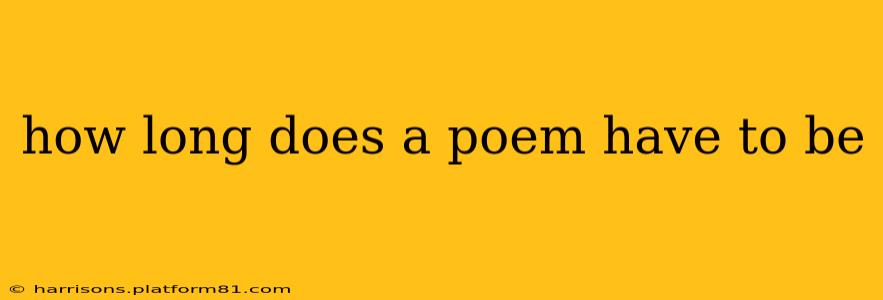How Long Does a Poem Have to Be? The Truth About Length in Poetry
There's no single answer to the question of how long a poem has to be. Unlike, say, a novel which typically needs a certain length to tell a complete story, poetry's beauty lies in its incredible flexibility. A poem can be as short as a single word or as long as an epic saga. What truly defines a poem isn't its length, but its use of language, imagery, and form to evoke emotion, create meaning, and explore ideas.
What are the shortest poems?
The shortest poems can be surprisingly impactful. A single word, carefully chosen for its resonance and suggestive power, can stand alone as a complete poem. Consider "Lighght" by Aram Saroyan, a visual poem consisting only of the word "lighght," utilizing the typography itself as a crucial element. This exemplifies how even the most minimalistic approach can create a powerful and effective poem.
How long are the longest poems?
On the other extreme, some poems stretch to epic proportions. The Mahabharata and the Odyssey, while often categorized as epics or narrative poems, are monumental works of poetry. Their immense length allows for complex plots, character development, and exploration of profound themes. While these are exceptional cases, they highlight the potential for limitless scope within poetic expression.
What are the different forms of poetry and their typical length?
Different forms of poetry often have conventions regarding length, but these are guidelines, not strict rules.
- Haiku: Traditionally, a haiku consists of three lines with a 5-7-5 syllable structure. Modern interpretations offer more flexibility, focusing more on the imagery and structure.
- Sonnet: A sonnet is a 14-line poem, typically following a specific rhyme scheme and meter (like iambic pentameter). Different types of sonnets (Shakespearean, Petrarchan) have slight variations in their structure.
- Limerick: A limerick is a five-line poem with a specific AABBA rhyme scheme and a rhythmic structure. It's typically humorous and relatively short.
- Free Verse: Free verse poems have no set rules regarding length, rhyme, or rhythm. The length is entirely determined by the poet's artistic vision.
Does the length affect the poem's quality?
Absolutely not. The quality of a poem hinges on its craft, not its length. A short, impactful poem can be just as powerful, and sometimes even more so, than a lengthy epic. Similarly, a long poem can become tedious or lose focus if not carefully constructed. A skilled poet can craft a masterpiece regardless of length, focusing on precision of language, evocative imagery, and the overall impact on the reader.
What length is best for beginners?
For aspiring poets, starting with shorter forms like haiku or tanka can be a valuable exercise in concision and precision. This allows focusing on mastering the use of language and imagery before tackling more ambitious lengths. But experimentation across different lengths is crucial for developing your own style and voice.
In conclusion, a poem's length is not a measure of its worth. Its impact depends on the skill and artistry of the poet in using language, form, and imagery to create a moving and meaningful piece. Whether a single word or a thousand lines, a poem’s true measure is the resonance it achieves with the reader.
